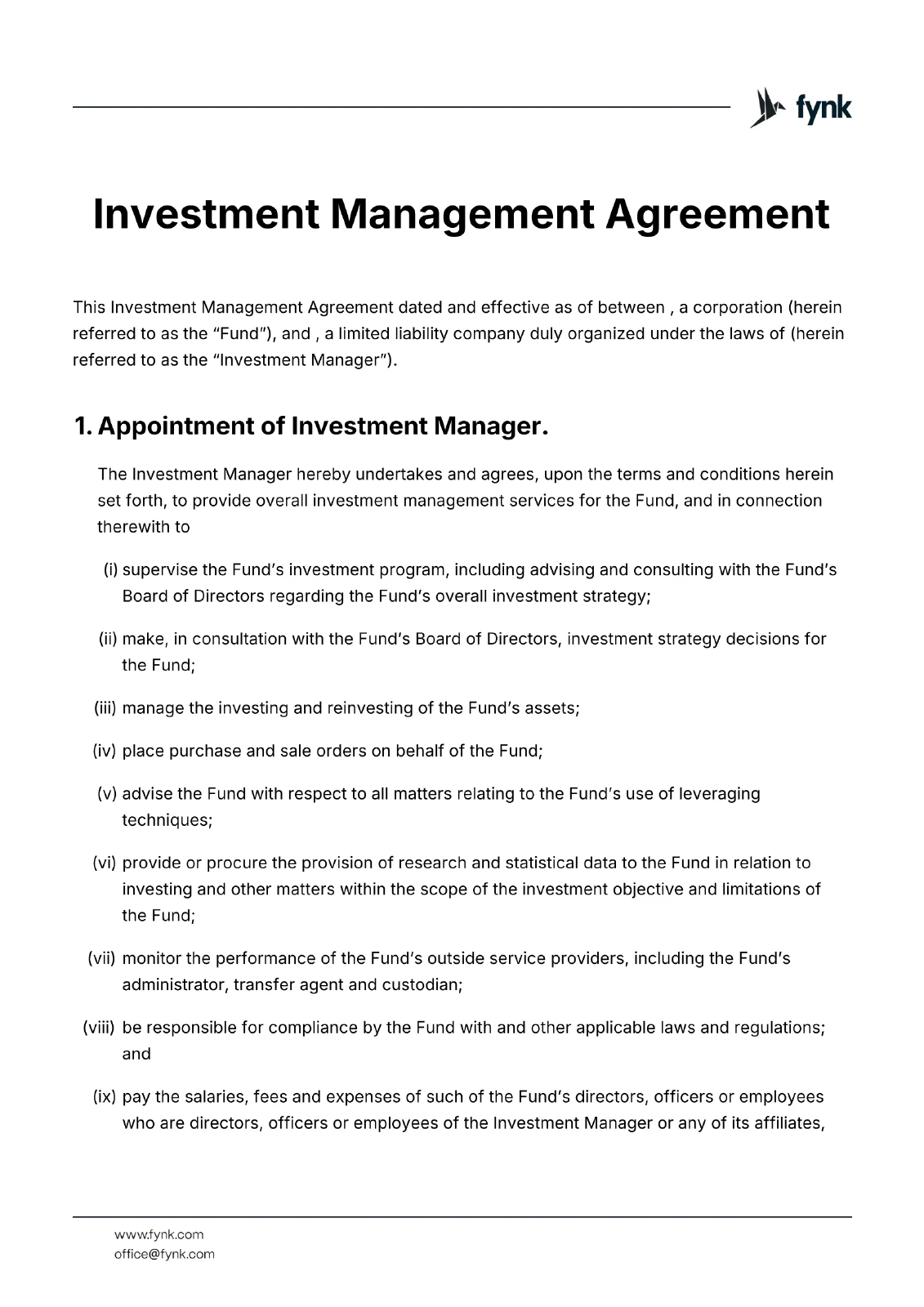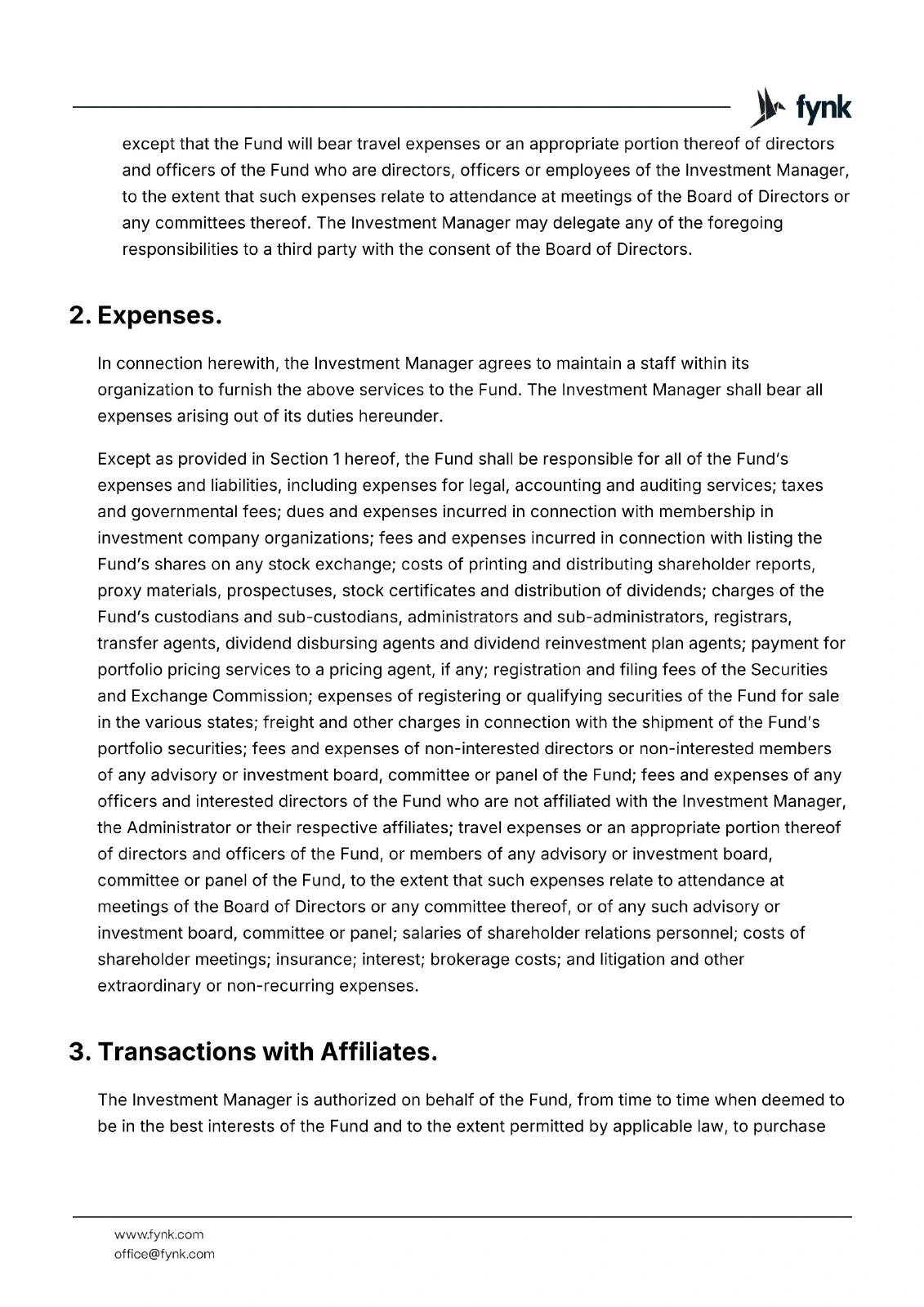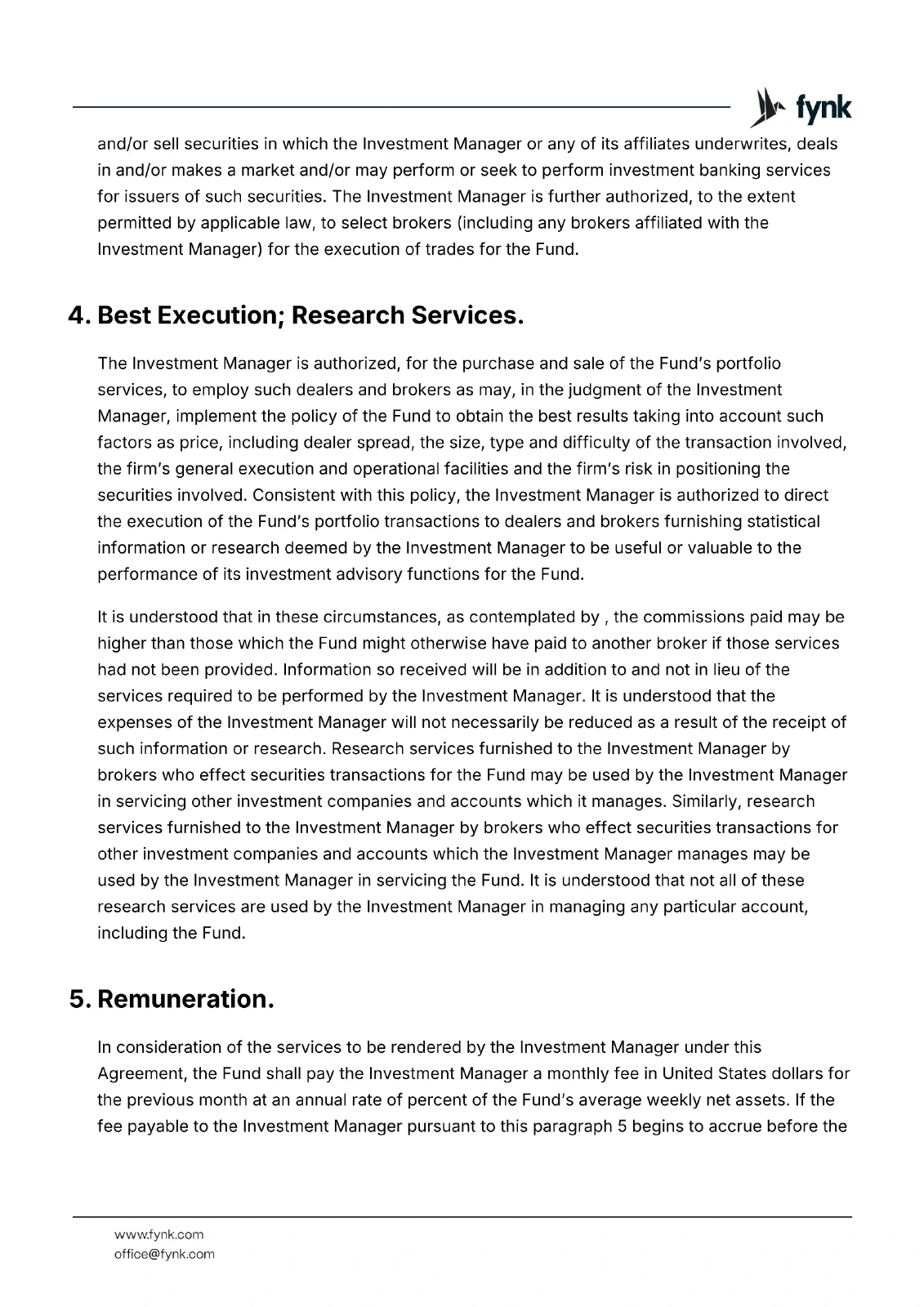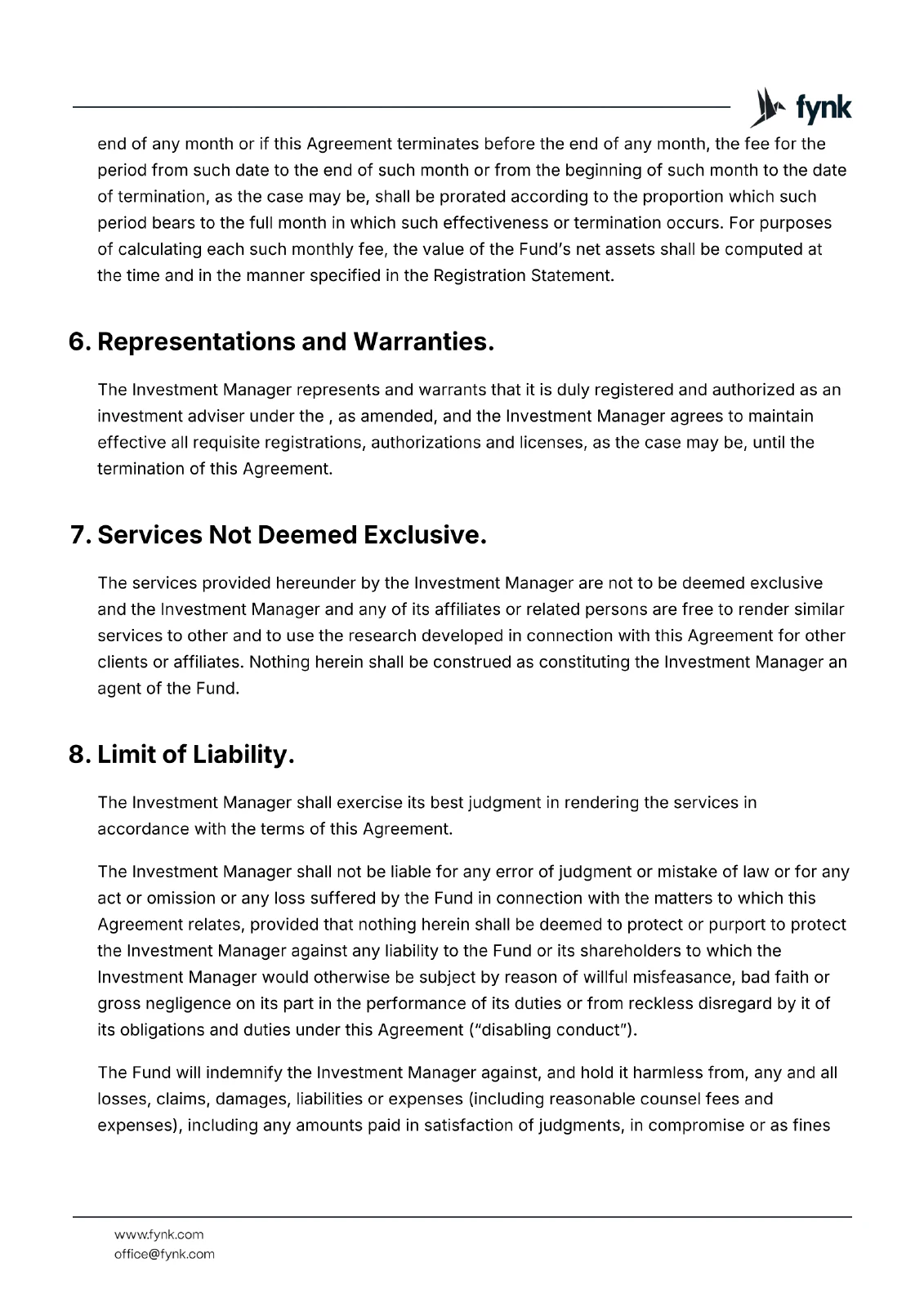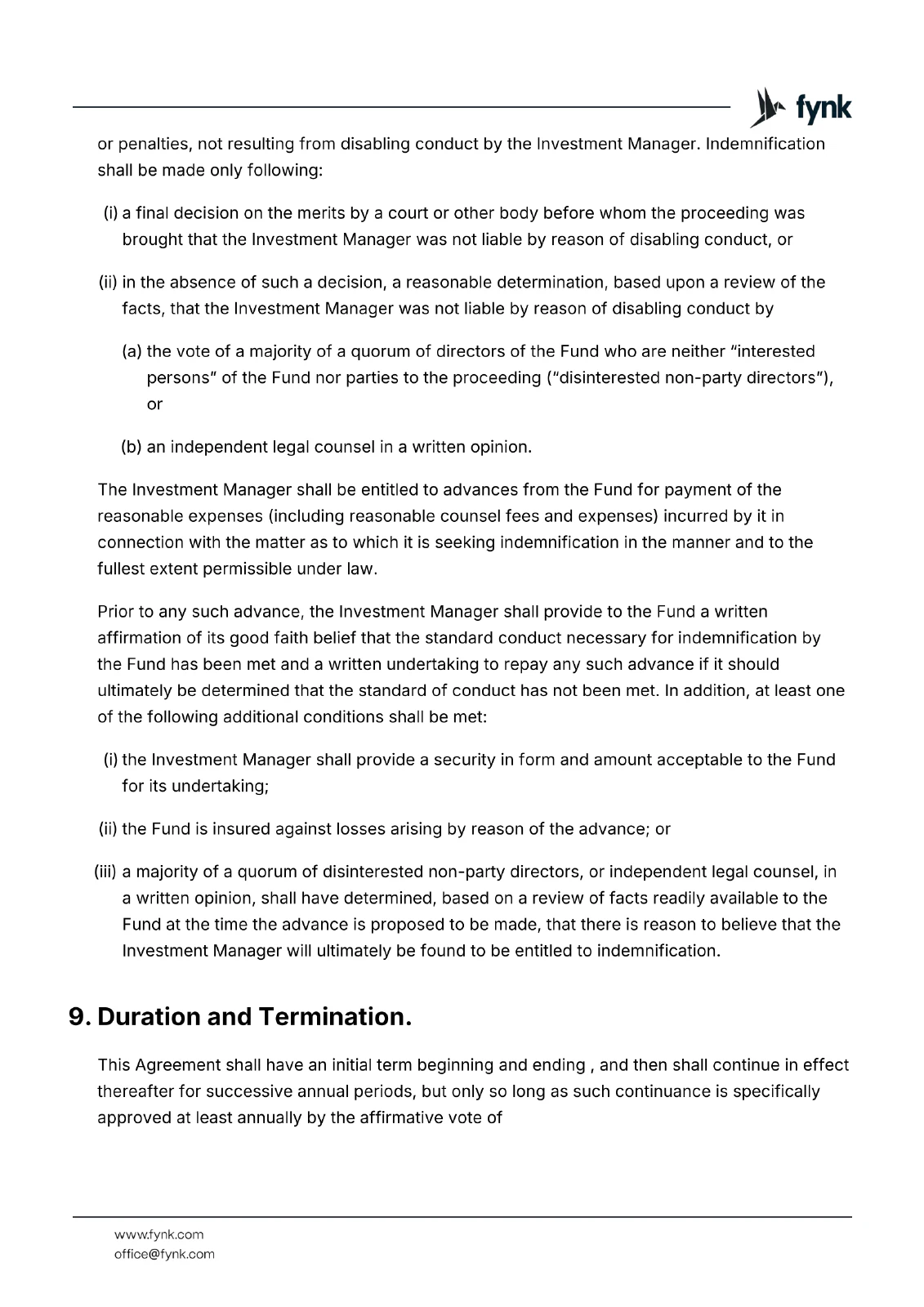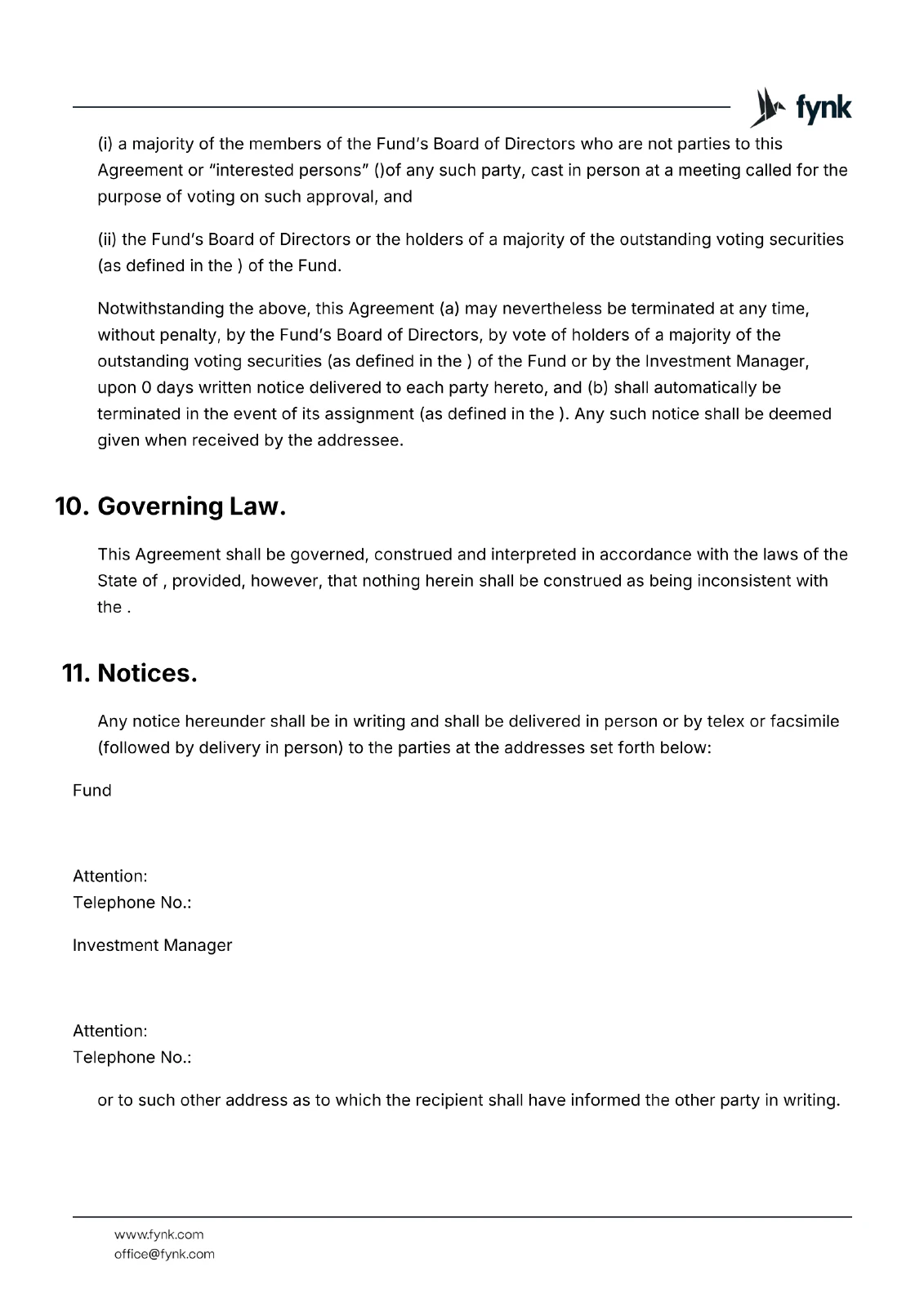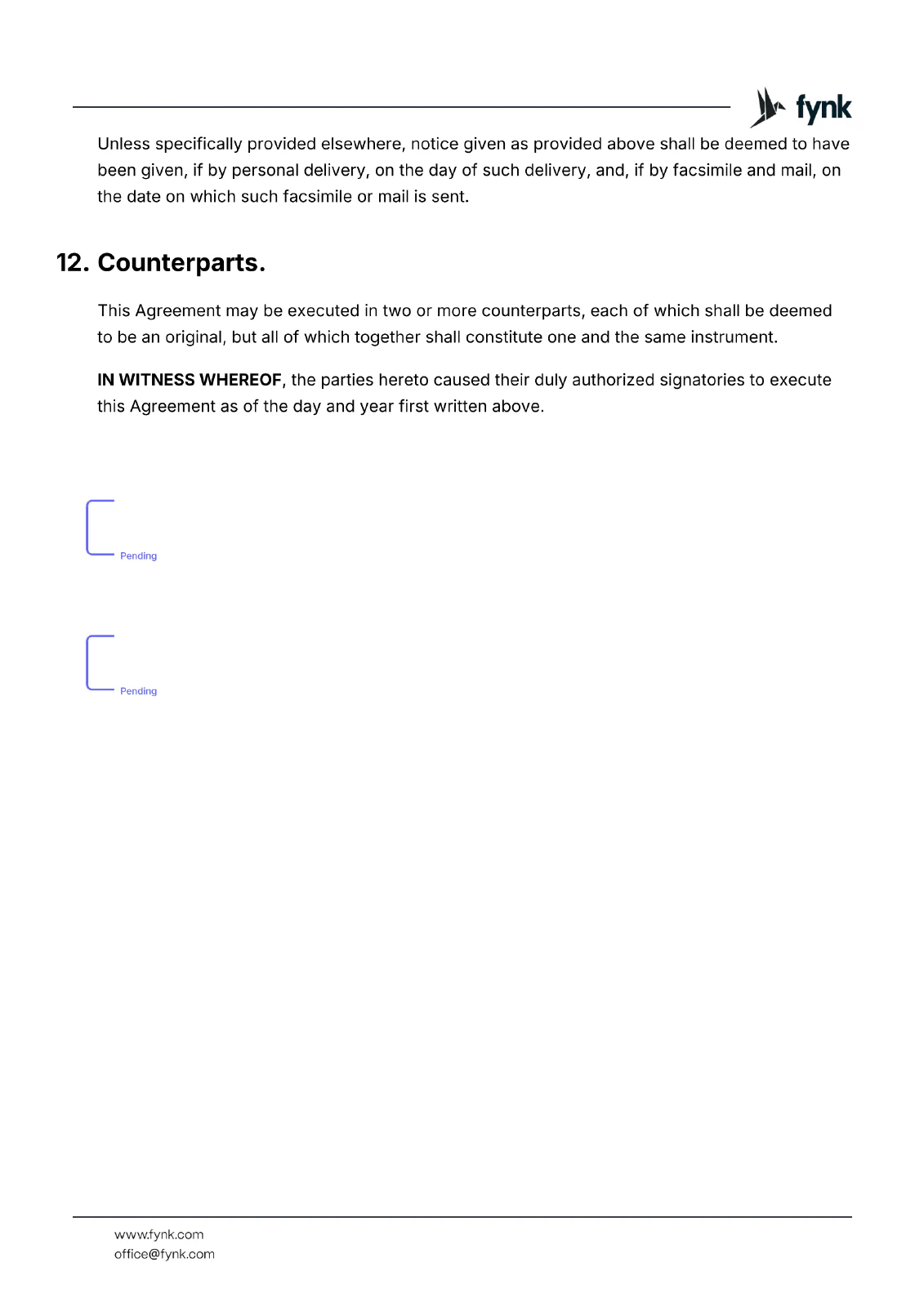Investment Management Agreement
This Investment Management Agreement dated and effective as of between , a corporation (herein referred to as the “Fund”), and , a limited liability company duly organized under the laws of (herein referred to as the “Investment Manager”).
Appointment of Investment Manager.
The Investment Manager hereby undertakes and agrees, upon the terms and conditions herein set forth, to provide overall investment management services for the Fund, and in connection therewith to
supervise the Fund’s investment program, including advising and consulting with the Fund’s Board of Directors regarding the Fund’s overall investment strategy;
make, in consultation with the Fund’s Board of Directors, investment strategy decisions for the Fund;
manage the investing and reinvesting of the Fund’s assets;
place purchase and sale orders on behalf of the Fund;
advise the Fund with respect to all matters relating to the Fund’s use of leveraging techniques;
provide or procure the provision of research and statistical data to the Fund in relation to investing and other matters within the scope of the investment objective and limitations of the Fund;
monitor the performance of the Fund’s outside service providers, including the Fund’s administrator, transfer agent and custodian;
be responsible for compliance by the Fund with and other applicable laws and regulations; and
pay the salaries, fees and expenses of such of the Fund’s directors, officers or employees who are directors, officers or employees of the Investment Manager or any of its affiliates, except that the Fund will bear travel expenses or an appropriate portion thereof of directors and officers of the Fund who are directors, officers or employees of the Investment Manager, to the extent that such expenses relate to attendance at meetings of the Board of Directors or any committees thereof. The Investment Manager may delegate any of the foregoing responsibilities to a third party with the consent of the Board of Directors.
Expenses.
In connection herewith, the Investment Manager agrees to maintain a staff within its organization to furnish the above services to the Fund. The Investment Manager shall bear all expenses arising out of its duties hereunder.
Except as provided in Section 1 hereof, the Fund shall be responsible for all of the Fund’s expenses and liabilities, including expenses for legal, accounting and auditing services; taxes and governmental fees; dues and expenses incurred in connection with membership in investment company organizations; fees and expenses incurred in connection with listing the Fund’s shares on any stock exchange; costs of printing and distributing shareholder reports, proxy materials, prospectuses, stock certificates and distribution of dividends; charges of the Fund’s custodians and sub-custodians, administrators and sub-administrators, registrars, transfer agents, dividend disbursing agents and dividend reinvestment plan agents; payment for portfolio pricing services to a pricing agent, if any; registration and filing fees of the Securities and Exchange Commission; expenses of registering or qualifying securities of the Fund for sale in the various states; freight and other charges in connection with the shipment of the Fund’s portfolio securities; fees and expenses of non-interested directors or non-interested members of any advisory or investment board, committee or panel of the Fund; fees and expenses of any officers and interested directors of the Fund who are not affiliated with the Investment Manager, the Administrator or their respective affiliates; travel expenses or an appropriate portion thereof of directors and officers of the Fund, or members of any advisory or investment board, committee or panel of the Fund, to the extent that such expenses relate to attendance at meetings of the Board of Directors or any committee thereof, or of any such advisory or investment board, committee or panel; salaries of shareholder relations personnel; costs of shareholder meetings; insurance; interest; brokerage costs; and litigation and other extraordinary or non-recurring expenses.
Transactions with Affiliates.
The Investment Manager is authorized on behalf of the Fund, from time to time when deemed to be in the best interests of the Fund and to the extent permitted by applicable law, to purchase and/or sell securities in which the Investment Manager or any of its affiliates underwrites, deals in and/or makes a market and/or may perform or seek to perform investment banking services for issuers of such securities. The Investment Manager is further authorized, to the extent permitted by applicable law, to select brokers (including any brokers affiliated with the Investment Manager) for the execution of trades for the Fund.
Best Execution; Research Services.
The Investment Manager is authorized, for the purchase and sale of the Fund’s portfolio services, to employ such dealers and brokers as may, in the judgment of the Investment Manager, implement the policy of the Fund to obtain the best results taking into account such factors as price, including dealer spread, the size, type and difficulty of the transaction involved, the firm’s general execution and operational facilities and the firm’s risk in positioning the securities involved. Consistent with this policy, the Investment Manager is authorized to direct the execution of the Fund’s portfolio transactions to dealers and brokers furnishing statistical information or research deemed by the Investment Manager to be useful or valuable to the performance of its investment advisory functions for the Fund.
It is understood that in these circumstances, as contemplated by , the commissions paid may be higher than those which the Fund might otherwise have paid to another broker if those services had not been provided. Information so received will be in addition to and not in lieu of the services required to be performed by the Investment Manager. It is understood that the expenses of the Investment Manager will not necessarily be reduced as a result of the receipt of such information or research. Research services furnished to the Investment Manager by brokers who effect securities transactions for the Fund may be used by the Investment Manager in servicing other investment companies and accounts which it manages. Similarly, research services furnished to the Investment Manager by brokers who effect securities transactions for other investment companies and accounts which the Investment Manager manages may be used by the Investment Manager in servicing the Fund. It is understood that not all of these research services are used by the Investment Manager in managing any particular account, including the Fund.
Remuneration.
In consideration of the services to be rendered by the Investment Manager under this Agreement, the Fund shall pay the Investment Manager a monthly fee in United States dollars for the previous month at an annual rate of percent of the Fund’s average weekly net assets. If the fee payable to the Investment Manager pursuant to this paragraph 5 begins to accrue before the end of any month or if this Agreement terminates before the end of any month, the fee for the period from such date to the end of such month or from the beginning of such month to the date of termination, as the case may be, shall be prorated according to the proportion which such period bears to the full month in which such effectiveness or termination occurs. For purposes of calculating each such monthly fee, the value of the Fund’s net assets shall be computed at the time and in the manner specified in the Registration Statement.
Representations and Warranties.
The Investment Manager represents and warrants that it is duly registered and authorized as an investment adviser under the , as amended, and the Investment Manager agrees to maintain effective all requisite registrations, authorizations and licenses, as the case may be, until the termination of this Agreement.
Services Not Deemed Exclusive.
The services provided hereunder by the Investment Manager are not to be deemed exclusive and the Investment Manager and any of its affiliates or related persons are free to render similar services to other and to use the research developed in connection with this Agreement for other clients or affiliates. Nothing herein shall be construed as constituting the Investment Manager an agent of the Fund.
Limit of Liability.
The Investment Manager shall exercise its best judgment in rendering the services in accordance with the terms of this Agreement.
The Investment Manager shall not be liable for any error of judgment or mistake of law or for any act or omission or any loss suffered by the Fund in connection with the matters to which this Agreement relates, provided that nothing herein shall be deemed to protect or purport to protect the Investment Manager against any liability to the Fund or its shareholders to which the Investment Manager would otherwise be subject by reason of willful misfeasance, bad faith or gross negligence on its part in the performance of its duties or from reckless disregard by it of its obligations and duties under this Agreement (“disabling conduct”).
The Fund will indemnify the Investment Manager against, and hold it harmless from, any and all losses, claims, damages, liabilities or expenses (including reasonable counsel fees and expenses), including any amounts paid in satisfaction of judgments, in compromise or as fines or penalties, not resulting from disabling conduct by the Investment Manager. Indemnification shall be made only following:
a final decision on the merits by a court or other body before whom the proceeding was brought that the Investment Manager was not liable by reason of disabling conduct, or
in the absence of such a decision, a reasonable determination, based upon a review of the facts, that the Investment Manager was not liable by reason of disabling conduct by
the vote of a majority of a quorum of directors of the Fund who are neither “interested persons” of the Fund nor parties to the proceeding (“disinterested non-party directors”), or
an independent legal counsel in a written opinion.
The Investment Manager shall be entitled to advances from the Fund for payment of the reasonable expenses (including reasonable counsel fees and expenses) incurred by it in connection with the matter as to which it is seeking indemnification in the manner and to the fullest extent permissible under law.
Prior to any such advance, the Investment Manager shall provide to the Fund a written affirmation of its good faith belief that the standard conduct necessary for indemnification by the Fund has been met and a written undertaking to repay any such advance if it should ultimately be determined that the standard of conduct has not been met. In addition, at least one of the following additional conditions shall be met:
the Investment Manager shall provide a security in form and amount acceptable to the Fund for its undertaking;
the Fund is insured against losses arising by reason of the advance; or
a majority of a quorum of disinterested non-party directors, or independent legal counsel, in a written opinion, shall have determined, based on a review of facts readily available to the Fund at the time the advance is proposed to be made, that there is reason to believe that the Investment Manager will ultimately be found to be entitled to indemnification.
Duration and Termination.
This Agreement shall have an initial term beginning and ending , and then shall continue in effect thereafter for successive annual periods, but only so long as such continuance is specifically approved at least annually by the affirmative vote of
(i) a majority of the members of the Fund’s Board of Directors who are not parties to this Agreement or “interested persons” ()of any such party, cast in person at a meeting called for the purpose of voting on such approval, and
(ii) the Fund’s Board of Directors or the holders of a majority of the outstanding voting securities (as defined in the ) of the Fund.
Notwithstanding the above, this Agreement (a) may nevertheless be terminated at any time, without penalty, by the Fund’s Board of Directors, by vote of holders of a majority of the outstanding voting securities (as defined in the ) of the Fund or by the Investment Manager, upon 0 days written notice delivered to each party hereto, and (b) shall automatically be terminated in the event of its assignment (as defined in the ). Any such notice shall be deemed given when received by the addressee.
Governing Law.
This Agreement shall be governed, construed and interpreted in accordance with the laws of the State of , provided, however, that nothing herein shall be construed as being inconsistent with the .
Notices.
Any notice hereunder shall be in writing and shall be delivered in person or by telex or facsimile (followed by delivery in person) to the parties at the addresses set forth below:
Fund
Attention:
Telephone No.:
Investment Manager
Attention:
Telephone No.:
or to such other address as to which the recipient shall have informed the other party in writing.
Unless specifically provided elsewhere, notice given as provided above shall be deemed to have been given, if by personal delivery, on the day of such delivery, and, if by facsimile and mail, on the date on which such facsimile or mail is sent.
Counterparts.
This Agreement may be executed in two or more counterparts, each of which shall be deemed to be an original, but all of which together shall constitute one and the same instrument.
IN WITNESS WHEREOF, the parties hereto caused their duly authorized signatories to execute this Agreement as of the day and year first written above.

